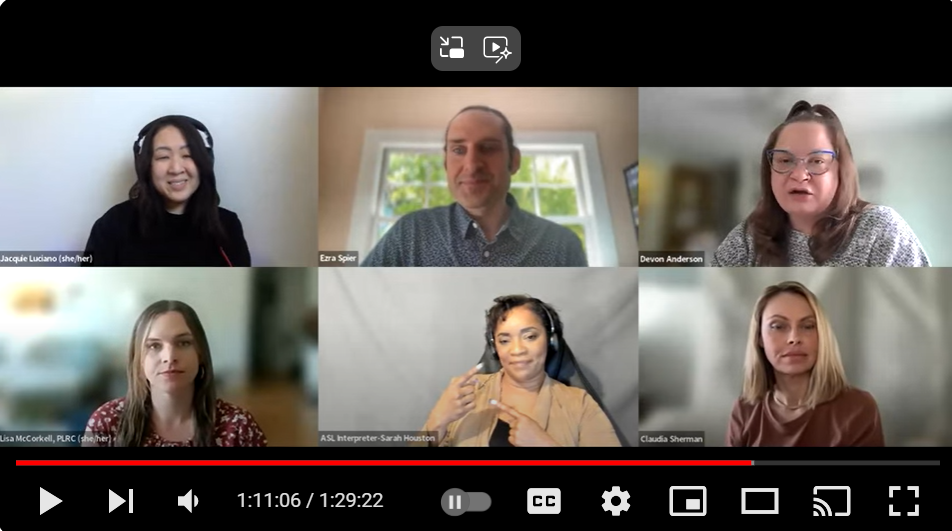On April 30th, the Disability Community Engagement Partner Project (DCEPP) at AAHD held our fourth conversation in the 2023-2024 Disability and Health Webinar series with “Long COVID, Disability & All of Us” Moderated by Ezra Spier, this conversation brought together a panel of disability community members and advocates to discuss Long COVID centered in a patient advocacy research agenda. Many thanks to our distinguished panelists who made this conversation possible. Learn more about our speakers in the section below along with additional resources shared during the panel.
Learn more about the All of Us Research Program and how inclusive research might support better health for all: https://bit.ly/JoinAOU-April30
Frequently Asked Questions
- What were the listed common symptoms and comorbidities of Long COVID?
The most common reported symptoms of Long COVID include fatigue; fever; and lung/respiratory symptoms, including difficulty breathing, shortness of breath and cough. Common neurological symptoms include difficulty concentrating, headache and sleep problems. Other symptoms include: dizziness on standing; pins-and-needles in limbs; loss of taste or smell; brain fog (neurofatigue); post-exertional malaise; and increases in depression and anxiety. Other commonly reported symptoms include joint and muscle pain, cardiovascular symptoms, digestive concerns, rashes, and changes in menstrual cycles.
Long COVID can also lead to an increase in the potential to develop an autoimmune disease, loneliness, increased likelihood of hypermobility and related conditions including Ehlers Danlos Syndrome, and cognitive decline. Certain communities, such as the disabled community, racial and ethnic communities, the aging population, and the LGBTQ+ community, have increased risks of developing Long COVID. Notable within the LGBTQ+ community, transgender individuals experience greater risk of experiencing Long COVID. Those living with other chronic or autoimmune conditions also face a higher likelihood of Long COVID.
- What is the process for obtaining disability benefits for Long-COVID and related conditions?
When seeking disability benefits for Long COVID, make sure to submit as much medical information as possible to your health insurance provider. Reference these resources for more information:
Guidance on “Long COVID” as a Disability Under the ADA, Section 504, and Section 1557
Developing SSI/SSDI Applications for Individuals with Long COVID
- In a clinical context, when is it appropriate to use the word “patient” vs. “client?”
Use of the word “patient” vs. “client” is very personal and can come across in different contexts, with many choosing to self-identify as patients with Long COVID in particular. Much work is being done by patient advocacy organizations, and that is their right to self-identify.
- Has there been any genetic testing to see if there are similar genetic variants to cause Long-COVID or more chance of getting it?
Long COVID is hard to define, as it is mainly defined by its symptomology, not by any successful diagnostic procedure. This makes understanding it on a genetic level even more complex. However, scientists have identified some connections to Long COVID through genetic testing. One potential genetic link to Long COVID has been found near a gene called FOXP4 that some people carry in the lungs and immune cells.
There is a growing body of research showing that genetics can influence COVID outcomes, including the longevity of symptoms, the severity of a COVID infection, and even COVID resistance. More research is needed, both in genetics and in Long COVID studies, to continue to uncover genetic factors.
- How can people access monoclonal antibodies for Long COVID treatment?
Laboratory studies have been inconclusive in demonstrating the clinical benefits of monoclonal antibodies as a treatment against COVID-19. Right now they are not being recommended by the COVID-19 Treatment Guidelines Panel to treat or prevent COVID-19 and Long-COVID. Treatment options through the Mayo Clinic are available on a limited basis, as they are refining their approach to treated patients with monoclonal antibodies and antiviral drug therapies.
- What are some of the effects on Long COVID for menstruating people?
For individuals who menstruate, there have been numerous studies done to try to understand the correlation between reproductive health and Long COVID. Some menstrual-related effects most reported are: irregular menstrual cycles, unusual clotting during cycles, worsening premenstrual syndrome (PMS), and development of premenstrual dysphoric disorder (PMDD).
Doctors link the worsening concerns to stress both in the mind and body of those living with Long COVID, as stress of all varieties can affect the menstrual cycle. As studies have been largely done externally, via media such as surveys, interviews, and firsthand experience of those affected by the changes, further studies are needed to explore potential physical, internal links between Long COVID and the menstrual cycle of those living with it.
In terms of menopause and the effects of Long COVID, British researchers have newly noted that menstruating people at midlife who have Long COVID seem to get specific, severe symptoms, including brain fog, fatigue, new-onset dizziness, and difficulty sleeping through the night. Lower levels of estrogen and testosterone appear to be the reason for these complications, and further research is needed to truly determine these links.
- In what ways can we advocate for the Long-COVID community?
Many patient-led organizations are leaders in Long COVID advocacy. Here are a few to follow for legislative updates and opportunities to take action: Long COVID Alliance; Long COVID Justice; Longhauler Advocacy Project; Long COVID Families; and Solve Long Covid Initiative. If you are looking for additional self-advocacy resources, check out the U.S. Department of Health and Human Services’ Guidance on “Long COVID” as a Disability Under the ADA, Section 504, and Section 1557. Consider using this toolkit to seek ADA accommodations for COVID mitigation when visiting your healthcare provider.
- What does Long-COVID research and advocacy look like on a global scale?
Patients have experienced a lack of medical expertise and appropriate treatment for Long COVID in both U.S. and international health care settings. While the United States has implemented a National Research Action Plan on Long COVID which helped to establish the RECOVER Initiative, other countries have yet to implement similar initiatives to direct research on Long COVID.
The global burden of COVID and post-viral conditions has disproportionately impacted the Global South, with lower rates of vaccination and less health research on the localized impacts. Global South countries have demonstrated a greater emphasis on social policy in their COVID responses. To support global health research on COVID and Long COVID, researchers have advocated for further communication between patients and experts to bridge divides across the Global North and South, and expand our understanding of patient experiences in a global context.
Internationally, research on Long COVID is underway at Kenyatta University and the CERCLE coalition’s Clinical Epidemiology Working Group.
- Where can I learn more about the All of Us Research Program and how to participate in Long COVID research?
The All of Us Research Program’s Frequently Asked Questions page answers general questions on eligibility, participation, genomic/DNA topics, samples/measurements, privacy, and more. All of Us offers data that can be used to study COVID-19 patient experiences and Long COVID conditions through surveys, electronic health records, and antibody testing of biosamples.
Resources
- PowerPoint Slides from Speakers
- Resources
- Long COVID Justice – Pandemics are Chronic: A Statement of Commitment to Long COVID Justice
- International Long COVID Awareness
- ME Action – Stop Rest Pace
- Dysautonomia International – What is POTS? (Postural Orthostatic Tachycardia Syndrome)
- COVID-19 Longhauler Advocacy Project – Long COVID Awareness Day
- Long COVID Families
- Long COVID Moonshot – Call Guide
- International Long COVID Toolkit
- Long COVID Studies – Research Trial Opportunities
- People’s CDC – ADA Rights Workshop – Template to Request Reasonable Accommodation
- Essays/ Articles
- The Long Haul – Lygia Navarro
- What Recovery? – Lygia Navarro and Johanna Bejarano
- Listening for the Long Haul: A Living History of Long COVID
- Books
- Let This Radicalize You: Organizing and the Revolution of Reciprocal Care – Kelly Hayes and Mariame Kaba
- The Long Covid Survival Guide: How to Take Care of Yourself and What Comes Next – Stories and Advice from Twenty Long-Haulers and Experts – Fiona Lowenstein (editor)
- Disability Visibility Project
- The Long Haul: How Long Covid Survivors Are Revolutionizing Health Care – Ryan Prior
- Clearing the Fog: From Surviving to Thriving with Long Covid –A Practical Guide – James C. Jackson
- The Long COVID Reader: Writing and Poetry from 45 Long Haulers – Andrew David King, Regan McMahon, and Mary Ladd (editors)
Meet the Panelists
 Dr. Monica Guitierrez (she/her) – Dr. Monica Verduzco-Gutierrez is an accomplished academic Physiatrist and Professor and Distinguished Chair of the Department of Rehabilitation Medicine at the Long School of Medicine at the University of Texas Health Science Center at San Antonio. She is also the Medical Director of Critical Illness Recovery and Neuro Rehabilitation at Warm Springs Rehabilitation Hospitals in San Antonio and Chief of the Physical Medicine and Rehabilitation service line at the University Health Hospital system. She is a fellow member of the American Academy of Physical Medicine and Rehabilitation, as well as on the board of trustees of the Association of Academic Physiatrists. Dr. Gutierrez excitedly moved to San Antonio to lead the distinguished Department of Rehabilitation Medicine in 2020. Her area of clinical expertise is the care of patients with traumatic brain injury, stroke rehabilitation, interventional spasticity management, and Long COVID. She has over 100 publications in these areas, as well as topics related to health equity and inclusion. She is also a sub-investigator in the NIH RECOVER trial through her institution, is the co-PI on a grant through AHRQ to expand multi-disciplinary Long COVID care, and runs many clinical trials related to spasticity management.
Dr. Monica Guitierrez (she/her) – Dr. Monica Verduzco-Gutierrez is an accomplished academic Physiatrist and Professor and Distinguished Chair of the Department of Rehabilitation Medicine at the Long School of Medicine at the University of Texas Health Science Center at San Antonio. She is also the Medical Director of Critical Illness Recovery and Neuro Rehabilitation at Warm Springs Rehabilitation Hospitals in San Antonio and Chief of the Physical Medicine and Rehabilitation service line at the University Health Hospital system. She is a fellow member of the American Academy of Physical Medicine and Rehabilitation, as well as on the board of trustees of the Association of Academic Physiatrists. Dr. Gutierrez excitedly moved to San Antonio to lead the distinguished Department of Rehabilitation Medicine in 2020. Her area of clinical expertise is the care of patients with traumatic brain injury, stroke rehabilitation, interventional spasticity management, and Long COVID. She has over 100 publications in these areas, as well as topics related to health equity and inclusion. She is also a sub-investigator in the NIH RECOVER trial through her institution, is the co-PI on a grant through AHRQ to expand multi-disciplinary Long COVID care, and runs many clinical trials related to spasticity management.
 Jacqueline Luciano (she/her) – Jacqueline E. Luciano (she/her) is a first generation Filipino-American, wife, and mother of two. She’s also a former Illinois Department of Public Health Surveillance Nurse and was working as a Regulatory Consultant until she became disabled by Long Covid and Associated Diseases (LCAD) in January 2022. Jacquie has experienced firsthand the challenges of navigating a complex healthcare system while battling Long COVID and Myalgic Encephalomyelitis (ME), both of which lack FDA-approved treatments. Her journey through these experiences has fueled a passion for reshaping public narratives and policies that have historically neglected disabled individuals and people with chronic invisible illnesses. Inspired by her own struggles, she strives for disability and racial justice, aiming to bring about positive change in healthcare and beyond. Her current projects are in collaboration with Long COVID Justice and MEAction, and she’s a Narrative Architect for “Listening for the Long Haul: A Living History of Long COVID”. Jacquie holds a Bachelor of Science in Nursing from Loyola University Chicago. Since encountering the benefits of modalities for her own lymphatic system, she aspires to be a holistic, person-centered Certified Lymphatic Practitioner & Integrative Health Coach.
Jacqueline Luciano (she/her) – Jacqueline E. Luciano (she/her) is a first generation Filipino-American, wife, and mother of two. She’s also a former Illinois Department of Public Health Surveillance Nurse and was working as a Regulatory Consultant until she became disabled by Long Covid and Associated Diseases (LCAD) in January 2022. Jacquie has experienced firsthand the challenges of navigating a complex healthcare system while battling Long COVID and Myalgic Encephalomyelitis (ME), both of which lack FDA-approved treatments. Her journey through these experiences has fueled a passion for reshaping public narratives and policies that have historically neglected disabled individuals and people with chronic invisible illnesses. Inspired by her own struggles, she strives for disability and racial justice, aiming to bring about positive change in healthcare and beyond. Her current projects are in collaboration with Long COVID Justice and MEAction, and she’s a Narrative Architect for “Listening for the Long Haul: A Living History of Long COVID”. Jacquie holds a Bachelor of Science in Nursing from Loyola University Chicago. Since encountering the benefits of modalities for her own lymphatic system, she aspires to be a holistic, person-centered Certified Lymphatic Practitioner & Integrative Health Coach.
 Lisa McCorkell (she/her) – Lisa McCorkell is a person living with Long COVID and the co-founder of the Patient-Led Research Collaborative, a group of Long COVID patients conducting research on Long COVID and advocating for better policies for disabled people. She is the co-author of several prominent Long COVID research studies, including a review in Nature Reviews Microbiology; has coordinated a patient-led biomedical research fund of $5 million toward Long COVID and associated conditions; and has co-created scorecards that evaluate meaningful patient engagement in research. She has a masters in public policy from University of California, Berkeley, and a background in social safety net policy and labor and employment issues.
Lisa McCorkell (she/her) – Lisa McCorkell is a person living with Long COVID and the co-founder of the Patient-Led Research Collaborative, a group of Long COVID patients conducting research on Long COVID and advocating for better policies for disabled people. She is the co-author of several prominent Long COVID research studies, including a review in Nature Reviews Microbiology; has coordinated a patient-led biomedical research fund of $5 million toward Long COVID and associated conditions; and has co-created scorecards that evaluate meaningful patient engagement in research. She has a masters in public policy from University of California, Berkeley, and a background in social safety net policy and labor and employment issues.
 Claudia Sherman (she/her) – Claudia Sherman is a Creative Director, Long Covid patient, and founding member of the grassroots advocacy group Long Covid Moonshot. Formed in October 2023, the group has brought a fresh energy to Long Covid advocacy, successfully advancing the conversation around the need for Long Covid research funding by combining patient experiences with research perspectives. Claudia Sherman lives in the California desert.
Claudia Sherman (she/her) – Claudia Sherman is a Creative Director, Long Covid patient, and founding member of the grassroots advocacy group Long Covid Moonshot. Formed in October 2023, the group has brought a fresh energy to Long Covid advocacy, successfully advancing the conversation around the need for Long Covid research funding by combining patient experiences with research perspectives. Claudia Sherman lives in the California desert.
 Ezra Spier (he/him) – Ezra Spier is an Oakland, California-based patient researcher, person with Long Covid, and creator of Long Covid Studies. He is a member of the Patient-Led Research Collaborative and Long Covid Moonshot. Outside of Long COVID advocacy, Ezra is an independent operations and technology consultant who helps organizations thrive through difficult periods of growth. Connect with Ezra at yesezra.com.
Ezra Spier (he/him) – Ezra Spier is an Oakland, California-based patient researcher, person with Long Covid, and creator of Long Covid Studies. He is a member of the Patient-Led Research Collaborative and Long Covid Moonshot. Outside of Long COVID advocacy, Ezra is an independent operations and technology consultant who helps organizations thrive through difficult periods of growth. Connect with Ezra at yesezra.com.
